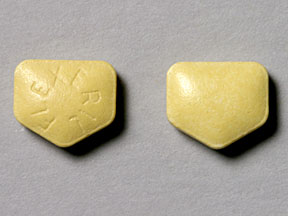Flexeril Disease Interactions
There are 2 disease interactions with Flexeril (cyclobenzaprine).
Cyclobenzaprine (applies to Flexeril) cardiovascular disease
Major Potential Hazard, Moderate plausibility. Applicable conditions: Hyperthyroidism, Cerebrovascular Insufficiency, History - Cerebrovascular Disease, History - Myocardial Infarction, Hypotension, Dehydration, Congestive Heart Failure
The manufacturers consider the use of cyclobenzaprine to be contraindicated in the acute recovery phase following myocardial infarction and in patients with hyperthyroidism, congestive heart failure, arrhythmias, heart block, and/or conduction disturbances. Cyclobenzaprine is structurally related to the tricyclic antidepressants, which have been reported to cause tachycardia, arrhythmias, heart block, hypertension, hypotension (particularly orthostatic hypotension), thrombosis, thrombophlebitis, myocardial infarction, strokes, congestive heart failure, and ECG abnormalities such as PR and QT interval prolongation. Therapy with cyclobenzaprine should be administered cautiously in patients with a history of cardiovascular or cerebrovascular disease or a predisposition to hypotension, particularly if the intended dosage exceeds those normally used for musculoskeletal conditions. Tachycardia, arrhythmia, palpitation, and hypotension have been reported with the use of cyclobenzaprine in less than 1% of patients.
Cyclobenzaprine (applies to Flexeril) anticholinergic effects
Moderate Potential Hazard, Moderate plausibility. Applicable conditions: Gastrointestinal Obstruction, Glaucoma/Intraocular Hypertension, Urinary Retention
Cyclobenzaprine has anticholinergic activity, to which elderly patients are particularly sensitive. Therapy with cyclobenzaprine should be administered cautiously in patients with preexisting conditions that are likely to be exacerbated by anticholinergic activity, such as urinary retention or obstruction; angle-closure glaucoma, untreated intraocular hypertension, or uncontrolled primary open-angle glaucoma; and gastrointestinal obstructive disorders. Glaucoma should be treated and under control prior to initiation of cyclobenzaprine therapy, and intraocular pressure monitored during therapy.
Switch to professional interaction data
Flexeril drug interactions
There are 454 drug interactions with Flexeril (cyclobenzaprine).
Flexeril alcohol/food interactions
There is 1 alcohol/food interaction with Flexeril (cyclobenzaprine).
More about Flexeril (cyclobenzaprine)
- Flexeril consumer information
- Check interactions
- Compare alternatives
- Reviews (239)
- Drug images
- Side effects
- Dosage information
- Patient tips
- During pregnancy
- Generic availability
- Support group
- Drug class: skeletal muscle relaxants
- Breastfeeding
Related treatment guides
Drug Interaction Classification
| Highly clinically significant. Avoid combinations; the risk of the interaction outweighs the benefit. | |
| Moderately clinically significant. Usually avoid combinations; use it only under special circumstances. | |
| Minimally clinically significant. Minimize risk; assess risk and consider an alternative drug, take steps to circumvent the interaction risk and/or institute a monitoring plan. | |
| No interaction information available. |
See also:
Further information
Always consult your healthcare provider to ensure the information displayed on this page applies to your personal circumstances.


